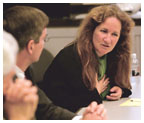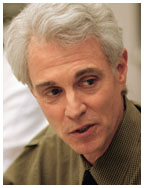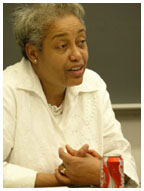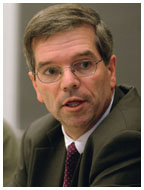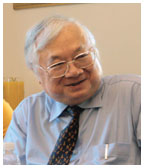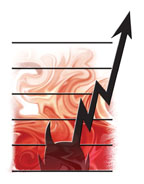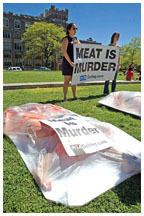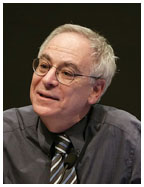
|
June 6, 2007: Notebook
New alert plan, safety reviewed
Views from the top: The Ivies’ women leaders reflect
Wu ’58 completes $100 million gift
Fourteen professors add ‘emeritus’ to their titles
In defense of Handel’s ‘Messiah’
Katherine Newman: “My rule of thumb is, if [an individual’s conduct] makes you nervous, you should tell someone.”
Daniel Silverman: “In the area of university health and mental health, the pendulum of the in loco parentis concept has really swung back.”
Janet Dickerson: “Students are quite alert to signs and symptoms and really do find ways to report these issues.”
Peter McDonough: “We almost celebrate eccentricities and we have an extremely high tolerance for differences of conduct.” (Photos: Frank Wojciechowski) |
Finding
ways to identify – and help – troubled students
In the wake of Virginia Tech, four experts discuss rights and
responsibilities
Universities across the country have been discussing issues of student mental health, privacy, and security in light of the shootings in April at Virginia Tech. PAW brought together four experts for a discussion: Katherine Newman, a professor of sociology and public affairs who has researched school shootings; Janet Dickerson, vice president for campus life; Daniel Silverman, executive director of University Health Services; and Peter McDonough, the University’s general counsel. A shortened and edited version of the meeting follows; the full account is online, click here.
When there’s concern that a student could cause harm to himself or herself or to others, what happens?
Dickerson: One of the great advantages that Princeton has is that we have a very taut network of deans, directors of study, upperclass deans, faculty advisers, and other administrators and staff members who are very observant. So we think that we are in a relatively good place as far as being a small-enough campus and an intimate-enough campus so that students who are in trouble might be observed by people.
Silverman: There’s a great deal of formal structure in place ... Our first goal is to help the student, not necessarily to be disciplinary or intrusive, but it’s really about making sure that a student’s medical and mental health needs are being met. Dr. [John] Kolligian, director of counseling and psychological services, shares a watch list of students of concern throughout the academic year, and those students are discussed in conferences on a monthly basis with members of the deans and directors group, and [Associate Dean] Hilary Herbold. So hopefully the students stay on our radar and have been offered help.
We also instituted a policy of so-called mandated evaluation so that any responsible adult on campus can initiate a request for formal evaluation of a student in distress. This is done literally scores of times throughout the aca-demic year, and it helps us make a connection to a student and begin to assess the level of their risk. [Through the] Princeton Depression Awareness Program, for the past two years, we have trained roughly 500 adult first responders on campus to recognize early signs and symptoms of depression and other forms of emotional stress in students at Princeton, to learn how to begin a conversation with the student, and to do everything they can if they have a high level of concern about a student to bring it to the attention of the appropriate responsible adult on campus.
Finally, we’re screening students with a validated depression-screening tool when they come in for primary care medical visits. Again, the hope is that we’re finding additional ways to identify students at risk who might not self-refer to mental health services. One of the tragedies is that of the 1,500 students [nationwide] who take their own lives on a college campus each year, we know that a thousand of them have never had a single visit to their university health service or their college counseling center. Those are the students that keep us up at night, because we don’t know about them.
What about privacy and the parent/family role?
McDonough: I’ve been here at Princeton for 16 years, and for all 16 years, I’ve been periodically over at the McCosh Health Center talking to the counseling people about what would we rather deal with: a contention or claim of a privacy violation, or a death? That answer is very easy to arrive at in the abstract. It gets harder when the folks in the counseling center present a continuum — the anorexic student who is on her way to a real problematic physical place, but even physicians can disagree about how far along on that continuum she is. So at what stage do we “act?”
We respond to conduct, not condition. But do it in a nuanced way, as Danny [Silverman] has suggested, so that hopefully we are supportive and not imposing discipline or restrictions or adjustments to rights and responsibilities, but bringing someone to that place as close to voluntarily as possible. I think it’s fair to say that, being as respectful as we possibly can be to the various laws, at the end of the day, we’re going to try to preserve life.
Newman: As a faculty member, I am very well aware that we have an abundant set of resources for helping our students. But it’s not always clear, at least to those of us who are relatively new to the campus, that we actually know how to activate these resources. I think there is some productive work that we can do to raise awareness and to be cognizant of the many things that faculty have in their minds. ... I am very reassured to hear my colleagues say two things: first, that protecting a student’s life is very important, and [second, that] protecting the safety of students and faculty around them is critical, because in my mind that should be really quite paramount. Everything else — being sued, being hauled in front of a regulatory board — all of that pales by comparison.
As a researcher I am aware of the extraordinary tension that students in this age group are under. I do worry about that. I think we have an extremely gifted student body, and they come to us as hypercompetitive people who are accustomed to being at the top of their game, and then they’re thrown into a cauldron in which everyone else is also at the top of their game. As someone who has taught freshman seminars and seen them when they first arrive here, there is a bit of a shock that comes with the readjustment of the pecking order. ... It can produce in some people extreme vulnerability.
The research that I have done shows very clearly that people [like the perpetrator at Virginia Tech] are problem-solving, as horrible as that may sound, through shooting. The problem they’re trying to solve is to change the image that other people have of them. And the groundwork for that is laid over a fairly long period of time. ... In the cases I studied, there were lots of warning signals. They were difficult to interpret, though, because unless you have in your mind that a shooting like this could happen, what you hear are vague hints and comments that don’t necessarily add up, and they’re often coming from someone who is known to make comments like this all the time.
Dr. Silverman, you’ve been quoted as saying that more than 50 percent of Princeton students report getting severely depressed every year. How do you distinguish between warning signals that require intervention and not-so-serious ones?
Silverman: It is a fact that the students here are under inordinate stress. [But one myth] is that this is particular to elite institutions. We find that this is true across the United States at most college and university settings. The fact should also be stated that the vast majority of people, even with serious mental health problems, do not act out violently.
We’ve been struck by a dramatic increase in students arriving as freshmen with serious vulnerabilities or mental health problems. It’s been estimated that the number of students arriving who have been appropriately diagnosed and treated with a psychotropic medication has grown tenfold in the last 10 to 20 years. It’s not been well studied, but I believe that we do a better job of diagnosing children in middle school and high school with depression, anxiety disorders, OCD [obsessive-compulsive disorder], attention deficit. They came from families of privilege where they could access good mental health care, so they were on medication and sometimes had psychotherapeutic intervention for years, and they were able to start college on time with their own cohort. They are actually coming in droves to us. The students are seeking us out, and it is kind of a good news-bad news story, but also we are providing help to a lot of students.
Are students, in fact, reporting to an adult, “Hey, my friend is having a lot of trouble here?”
Dickerson: I think that students are quite alert to signs and symptoms and really do find ways to report these issues. I’d also say that we’ve had some good intuitions from parents who may have some concerns. The good news is that a parent might pick up some indication that a student is staying in her room, not following through in ways that she should, or not taking her medication.
Silverman: I get lots of calls from parents saying, “Go check on my child.” ... We also encourage students to contact us anonymously if they’re concerned enough about [another] student. We are concerned: The students here are fantastic, and very often they will try to sustain and pump up a friend, a roommate, or a teammate for far too long. And we try to convey the idea that we don’t want you to be psychotherapists or psychiatrists here — your responsibility is to get the student to professional help.
McDonough: One of the things that we haven’t talked about yet directly is the wonderful set of protections for what we would term “disabled” people. And I use that word only because of the commonly known Americans with Disabilities Act, and we have a New Jersey equivalent. It’s always seemed to me that one of the challenges on a college campus is that in many ways we almost celebrate eccentricities, and we have an extremely high tolerance for differences of conduct.
The law says that if someone as an employee or a student can perform the essential functions that are expected of them with reasonable accommodations, then they’re otherwise qualified to be a student [or] an employee. It makes it very hard to deal with that person, even when you’re talking about conduct, because we have wide tolerance for conduct. It’s very hard for us to say, “Geez, this person has acted strangely.” In a lot of our departments, somebody would say, “Yeah, and what’s the point?”
Newman: I think that knowing that makes faculty and other employees very hesitant about how aggressively they should bring forward conduct that makes them nervous. But my rule of thumb is, if it makes you nervous, you should tell someone, because your instincts are telling you something that someone else can help you calibrate. I think it’s also very important to recognize that — and we don’t like to talk about this very much — we are involved in inherently tension-creating situations. I grade people. I know that the grades I give them have an impact on what kind of future they can expect to have. In the aftermath of the Virginia Tech situation, I can tell you that dozens of faculty members have felt anxious about how far can this tension go before you should be worried about the student who’s upset about their grade.
Is there a point at which Princeton says, “We’re so concerned about you that if you don’t get treatment — even though you’re getting straight A’s — you have to leave this campus”?
Silverman: I can give you so many examples. The one that comes to mind is the student with a severe eating disorder that is beginning to cross over the line into medical emergency and urgency — a situation in which there is irreversible bone density loss — and yet the student is still passing all of her courses. You ask the parents to come in, and the parents say that she would do much worse at home, because there is so much more structure here, and she loves her courses. Of course she’s dealing with her courses the way she’s dealing with her body, which is in a terribly perfectionist, driven, and hypervigilant style of coping. And at the end, when asked the question of what’s the right thing to do, we say that we’re a residential college, not a residential treatment center. And in fact, we think that your current health behaviors are putting your long-term health and well-being at grave risk.
And we’ve had parents who have said that you [Princeton] entered into a contract to educate my daughter, and under the Americans with Disabilities Act, she’s meeting her academic requirements, and if she’s harming anyone, she’s harming herself. Although students with severe emotional distress often create an enormous stress and tension for what I refer to as the “surround.” They are having an impact on the residential life of the University, so we’re always balancing what’s in the best interest of the individual student and what’s in the best interest of creating and sustaining a healthy environment for the entire campus.
Dickerson: There is a range of responses that we can provide, from requiring a student to live off campus, to requiring a student to go home for a year and get medical treatment or psychiatric or psychological treatment before returning. Pete’s comment about our response to conduct, not condition, is very important here. But if there’s evidence of bad behavior, we can expel a student from school.
Do parents have a realistic expectation of what the University can and cannot do?
Dickerson: It depends. We have what we have been commonly calling “helicopter parents.” You name whatever the fastest, fiercest, most hovering helicopter is — we’ve got those kinds of parents here at Princeton. I think some people understand, and others really want the University to deal with the problems or challenges that they feel they can’t deal with at home.
Silverman: I do think that certainly in the area of university health and mental health, the pendulum of the in loco parentis concept has really swung back to the feeling that these are partially formed adults who still need a great deal from us.
We’ve done some fairly amazing things with keeping students in school by providing intensive treatment. But there’s a certain point, clinically, where these problems are so severe that the level of clinical intensity that is needed to treat the student makes it impossible to be a fully engaged student at Princeton. Very often [a] year off is very helpful. We often send them home with a very detailed bill of particulars of what is expected in terms of treatment, counseling, medication, exercise, support, and we also ask and receive written permission from the students and the parents to let us talk to their caregivers so that we follow them during the time that they’re away from Princeton. And we’ve had enormously successful returns of students to this campus.
McDonough: I want to emphasize that 99 percent of those times, it’s through a process of collaborative and voluntary conversations.
What’s important for parents to know about these issues as their children go off to college?
Newman: I think parents have to learn to trust their children and trust their instincts, and understand that the launching of the child into the world is always something that is going to be accompanied by a certain amount of anxiety. At the other end is a fully formed adult human being, which is what we’re all looking for colleges to help us produce. ... When a case like [Virginia Tech] happens, everyone feels shaken. Everyone feels like they can’t judge how safe an environment is. And it takes time for us to equilibrate and recognize that it’s been 40 years since something like this happened [on a college campus]. That doesn’t mean we take no lessons from it, but it should not mean that we overreact to it and see a shooter around every corner, because they are not there.
Dickerson: First of all, having communications with one’s student is very important, because if you are an observant parent and listen and are open to hearing what students have to say and are trustworthy, you can usually find out or know what is going on. And the other thing I would offer is that most campuses are very safe environments, but no place is completely safe. So for parents to have realistic expectations about what the community will be like is a very important thing.
Silverman: The message I would like them to share with their
children is not to be afraid to ask for help. It takes a strong person
to ask for or use help; it’s not a sign of failure or weakness or
moral failure to look to the adults and various kinds of support services
that are here for the very reason that people need them. Finally, encouraging
students to understand that there is so much more that goes into a Princeton
education than simply what goes on in the classroom. My hope is that students
not only come out with a great font of knowledge after being at Princeton,
but also a great deal of experiential enrichment.![]()

New alert plan, safety reviewed
In the aftermath of the Virginia Tech shootings, the University has reviewed its emergency response procedures, reached out to local and county law enforcement agencies, and arranged for additional “active-shooter response” training, public safety director Steven J. Healy said.
On May 11 the University held the first campuswide test of its new emergency notification system, purchased in April before the killings at Virginia Tech. Nearly 11,700 of the 12,000 students, faculty, and staff registered personal contact information with the University, and 87 percent received a test message by phone within an hour.
Most calls were received within 20 minutes, the University said.
In communicating with the Univer-sity community in case of emergency, “We have every tool Princeton really needs,” said Mark Burstein, executive vice president. These include use of Web announcements, an automated message line, a new Tiger TV emergency alert system, local radio stations, door-to-door notifications, and posters.
Burstein said Princeton’s emergency-preparedness task force meets regularly and has designated an emergency operations center and a crisis team. Detailed plans have been prepared to respond to public-safety incidents, health and environmental emergencies, power outages, and weather-related disruptions, he said.
Healy said that since the University’s 50 public safety officers are unarmed, their role in case of a violent incident would be to get to the scene quickly, assess the situation, call for backup from borough and township police, and set up a security perimeter.
Burstein said that the University has had “an ongoing conversation
for a number of years” about whether public-safety officers should
carry weapons. But on a campus where the major crime is theft of unattended
property, he said, armed officers are not necessary and would “change
the culture of the institution very significantly.” ![]()
By W.R.O.

Views from the top: The Ivies’ women leaders reflect
As an undergraduate, Amy Gutmann wanted to be a math teacher. Shirley Tilghman always thought she would spend her entire career in a laboratory. Ruth Simmons once wrote the best paper in a class at Harvard, only to have the professor never again speak to her because she is an African-American woman. Judith Rodin never thought she would stop teaching.
The four women, all whom are current or former presidents of Ivy League universities, gathered May 2 at Harvard’s Loeb Drama Center for a forum entitled, “Women at the Top: The Changing Face of the Ivies,” moderated by incoming Harvard president Drew Gilpin Faust.
In a conversation that touched on subjects ranging from the American university’s place in an age of globalization to each woman’s path to the highest ranks of academic leadership, from overcoming gender and racial bias to advice for the husbands of university presidents, the four leaders said their appointments represent a turning point in higher education and urged other Ivy schools to follow suit.
“It’s a league, and it is a league based on competition,” said Simmons, the president of Brown University. “When it starts coming to the issue of becoming the last Ivy League university who doesn’t have a woman president, who wants that?”
The women spoke of being extremely ambitious and expecting to succeed, but none dreamed of becoming president of an Ivy League university, a position held exclusively by men until Rodin was named president of the University of Pennsylvania in 1994.
Tilghman said she was more surprised than anyone at her career path. A molecular biology professor serving as a member of Princeton’s presidential search committee, she left a committee meeting for a break. Upon returning, she was asked to assume the presidency.
“Since I was 5 years old I wanted to be a scientist, and it never really occurred to me that I was going to do anything else with my life,” she said. If she hadn’t been chosen for the search committee, she said, “I probably would still be a scientist.”
Reaching the top requires “an absolute inability to recognize reality,” Tilghman added.
The panelists noted that tenured faculty appointments are disproportionately given to men, and said more flexible schedules and aggressive recruitment are needed to hire and retain female professors, especially in math, science, and engineering.
Princeton played a prominent role in the conversation. Gutmann, the president of Penn, served at Princeton for 25 years, most recently as provost. During Simmons’ 10 years at Princeton, she served as associate dean of the faculty and vice provost.
Gutmann, Simmons, and Tilghman all said that president emeritus Harold T. Shapiro *64 had played an integral role in their careers. They pointed to his belief in putting the best person into a position, regardless of gender or race.
“He was an amazing path-breaker in giving women opportunities,” Gutmann said.
Simmons said Shapiro first let her shine when he asked her to chair a cabinet meeting in his absence, even though she was its most junior member.
Gutmann said the key point in her career came when she became a founding member of Princeton’s Center for Human Values and had to start fundraising.
“I went to see [Laurance] Rockefeller [’32] in my first fundraising venture,” she said. “At that lunch he committed a million dollars ... and a week later he gave $21 million to the Center for Human Values. It sort of opened my eyes to a world that was thrilling in a very different way than the world I always loved and still love, scholarship and teaching.”
Responding to an inquiry from PAW after the forum, Shapiro described
Tilghman, Gutmann, and Simmons as “real pioneers” and said
he was “very grateful and proud” to have been credited by
them. “If I have played even a small role in the development of
these distinguished leaders, it is certainly very rewarding,” Shapiro
said in an e-mail. ![]()
By Katie Zezima
Katie Zezima is a freelance journalist based in Boston.

Gordon Y.S. Wu ’58, during a May 14 visit to campus, fulfilled a pledge made 12 years ago. (DENISE APPLEWHITE/OFFICE OF COMMUNICATIONS) |
Wu ’58 completes $100 million gift
As an undergraduate, Gordon Y.S. Wu ’58 majored in civil engineering, and the young man who would become one of Hong Kong’s most successful entrepreneurs already had an eye for finance. He tried to estimate a balance sheet for his department, calculating the tuition from its 50 concentrators and comparing that with expenses. “They lose money left, right, and center,” Wu recalls thinking, before realizing that alumni gifts covered the difference. “In a way, I was at Princeton at the generosity of the University and of the past donors, so I wanted to do the same thing.”
Wu expressed his generosity in record fashion in November 1995, pledging $100 million to Princeton — the University’s largest donation at the time. On May 14, he completed the gift, delivering a check in a simple white envelope to Nassau Hall. Actually, Wu’s recent deposit brought his total to $99,998,042. The final $1,958 will be added in May 2008, when Wu’s class celebrates its 50th reunion.
Since 1995, Wu has had financial “ups and downs,” he said. Stock in Wu’s company, Hopewell Holdings, plummeted during the Asian financial crisis of the late 1990s, but he remained optimistic, quoting Yogi Berra’s famous “it ain’t over ’til it’s over” line in newspaper interviews. The University showed patience and treated him “like a family member,” he said, and Hopewell Holdings recovered, posting its highest profit in more than a decade in 2006.
Wu’s major gifts to Princeton began in 1981, when he endowed a professorship in Chinese studies that helped lure Professor Denis Twitchett from Cambridge University. In 1983, at Wu’s 25th reunion, the University dedicated Wu Hall, the dining and social center of Butler College, and Wu also funded the construction of Bowen Hall, the home of the Princeton Materials Institute. His $100 million gift supports teaching and research initiatives at the engineering school, including the recently created Wu Fund for Excellence and Innovation in Engineering.
Wu said his gifts responded to priorities expressed by Princeton’s presidents: “It would be wrong for me, 10,000 miles away, to really tell the University what to do.” Distance also has kept Wu from serving as a Princeton trustee; he said he could not commit to attending the board’s six meetings each year.
Wu’s $100 million gift is no longer Princeton’s largest.
Peter B. Lewis ’55 gave $101 million in 2006 to support the University’s
creative and performing arts programs, and later that year, when Lewis
visited Hong Kong, the two top donors dined on Lewis’ yacht. “You
beat my $100 million, but I’m very happy to be Avis,” Wu said
he told Lewis. “You know the old Avis saying — ‘we are
only number two; we have to try harder.’” ![]()
By B.T.

The current ACADEMIC CALENDAR will remain in place “for the foreseeable future,” Dean of the College Nancy Malkiel reported at the May 14 faculty meeting. Malkiel, the chairwoman of the Committee on the Course of Study, said that after two years of exploring a new calendar, the committee plans to “take a breather.”
A recent survey showed that two-thirds of responding faculty favor changes to the calendar, but none of the committee’s four proposed alternatives, released in November 2006 and February 2007, garnered majority support.
Former New Jersey governor THOMAS KEAN ’57 has
been named a trustee of the Robertson Foundation, created in 1961 to support
the graduate program of the Woodrow Wilson School following a $35 million
gift from Charles Robertson ’26 and his wife, Marie. Kean succeeds
John J.F. Sherrerd ’52, the foundation’s longtime investment
committee chairman, who was praised by President Tilghman as a “wise
and thoughtful trustee.” The Robertsons’ son, William Robertson
’72, said his family was “delighted” with the selection
of Kean, who also headed the 9/11 Commission. Members of the Robertson
family have sued the University, seeking to regain control of the foundation’s
endowment. ![]()

(STEVEN VEACH ) |
Vice’s virtue
In the stock market, sometimes it pays to be bad. Stocks for companies
related to human vices outperform comparable peers, according to a recent
study by Princeton economics professor Harrison Hong and Marcin Kacperczyk,
a colleague from the University of British Columbia. Their research, which
focused on the gaming industry and companies that produce alcohol or tobacco,
found that annual returns for vice-related stocks are 3.6 percent higher
than the returns for stocks of comparable non-vice goods like food, soft
drinks, and hotels. Investors that are subject to public scrutiny, such
as universities or pension funds, tend to avoid holding shares in tobacco,
alcohol, and gaming companies, the researchers found, but hedge funds
and mutual funds without social constraints cash in on the so-called sin
stocks. ![]()

(Hyunseok Shim ’08) |
Members of the Princeton Animal Welfare Society, a student group, held
a demonstration May 8 outside the Frist Campus Center to dramatize their
case against eating meat. The protest was cosponsored by People for the
Ethical Treatment of Animals (PETA). Ten students stripped down to bikinis
or underclothes, smeared fake blood over their bodies, lay down on white
trays, and covered themselves with plastic sheets to resemble packages
of meat sold in supermarkets. Giant barcode labels attached to some of
the plastic sheets advertised “Flesh.” Said Stephanie Hill
’08, a participant: “It’s kind of provocative, it’s
weird, it makes people realize that eating meat is disgusting and unnecessary.”
![]()
By Elyse Graham ’07

Fourteen professors add ‘emeritus’ to their titles
Fourteen professors, with a combined total of 458 years of teaching at Princeton, have transferred to emeritus status.
PAUL BENACERRAF ’52 *60, the James S. McDonnell Distinguished University Professor of Philosophy, has been a member of the faculty since 1960. His interests are in logic, the philosophy of mathematics, epistemology, metaphysics, and the philosophy of language. He twice served as chairman of the philosophy department and held administrative positions as associate dean of the Graduate School, associate provost for special studies, and provost.
Politics professor NANCY BERMEO’s work has focused on the causes and consequences of regime change, especially in Western Europe and Latin America. A member of the faculty for 25 years, she has been active in promoting gender equity. In 1998 she was the first recipient of the Stanley Kelly Jr. Teaching Award.
HERMAN S. ERMOLAEV *59, professor of Slavic languages and literatures, joined the faculty in 1959. An authority on Russian literature of the Soviet period, he has taught both advanced courses and a survey course on Soviet literature that attracted as many as 350 students a semester.
Psychology professor SAM GLUCKSBERG, a faculty member for 44 years, has been a pioneer in exploring how people use and understand language in everyday life, especially their use of metaphor, irony, sarcasm, and idioms. He has been a popular teacher of “Introduction to Psychology” and “General Psychology.”
MAITLAND JONES JR., the David B. Jones Professor of Chemistry, came to Princeton in 1964. His research lab focused on reactive intermediate chemistry, but he is best known for developing a small-group, problem-based approach to teaching “Orgo” — the introductory, yearlong course in organic chemistry taken by most scientists, engineers, and premed students at Princeton.
DANIEL KAHNEMAN, the Eugene Higgins Professor of Psychology and professor of psychology and public affairs in the Woodrow Wilson School, has been a faculty member since 1993. His research on judgment and decision-making is widely cited, especially in economics; more recently he has focused on the psychological underpinnings of subjective well-being. He won the 2002 Nobel Prize in economics.
ULRICH KNOEPFLMACHER *61, the William and Annie S. Paton Foundation Professor of Ancient and Modern Literature, came to Princeton in 1979. A scholar of Victorian fiction, he is known for his work on children’s literature, which helped to attract the Cotsen Collection to Firestone Library. Dedicated to teaching at all levels, he has been actively involved with the Teachers as Scholars program.
SUZANNE NASH *72, professor of French and Italian, has researched and taught French poetry and poetic theory and the interrelationships of poetry and the visual arts and sculpture. A faculty member since 1972, she served as acting director of the Program in Women’s Studies in the early 1990s.
ANDREW H. PLAKS ’67 *73, professor of East Asian studies and comparative literature, joined the faculty in 1973. A scholar of early Chinese philosophical and historical texts and Min-Qing fiction, Plaks also has studied premodern Japanese literature. He has published significant works in three languages — English, Chinese, and Hebrew.
THOMAS G. SPIRO, Eugene Higgins Professor of Chemistry, began teaching at Princeton in 1963, focusing on research in bioinorganic chemistry, biophysical chemistry, and environmental chemistry. Spiro is a former chemistry department chairman and helped create the Princeton Environmental Institute.
Sociology professor HOWARD F. TAYLOR came to Princeton in 1973. He directed the Program in African-American Studies from 1973 to 1988 and helped shape the sociology department’s courses in the study of race, social class, and gender. He is best known for teaching “The Social Basis of Individual Behavior” and “Race, Class, and Intelligence in America.” In 2000 he received the President’s Award for Distinguished Teaching.
SCOTT D. TREMAINE *75, the Charles A. Young Professor of Astronomy on the Class of 1897 Foundation, joined the University’s astrophysics department in 1997. His research topics have included the size of our galaxy, the growth and properties of black holes, and the structure of the Andromeda galaxy. He also served as department chairman for eight years.
JOHN R. WILLIS, professor of Near Eastern studies, came to Princeton in 1972. His work has centered on Islam in Africa, with his recent research on fatwas, or legal opinions. Willis was chairman of the African-American studies program in 1972.
JOHN WILMERDING, the Christopher Binyon Sarofim ’86
Professor in American Art, joined the faculty in 1988. A noted curator,
collector, and historian of American artistic traditions, he donated a
collection of 19th-century American art to the National Gallery of Art
in 2004 and a collection of American Pop Art to the University Art Museum
this year. Wilmerding was chairman of the Department of Art and Archaeology
from 1992 to 1997, and his courses in the department and for the Program
in American Studies consistently have been popular. ![]()

Bohdan Paczynski, the Lyman Spitzer Jr. Professor of Theoretical Astrophysics,
died April 19 of brain cancer. He was 67. Paczynski, who came to Princeton
in 1982, was a pioneer in discovering objects in space and calculating
their mass through a technique known as gravitational lensing, in which
the gravity of a massive body bends light that passes by. Among the discoveries
produced by this technique was the first terrestrial planet found outside
our solar system. His research also focused on gamma-ray bursts and the
structure of galaxies. ![]()

(Hyunseok Shim ’08) |
“In the United States, you could say we have a marketplace of communities as much as we have a marketplace of ideas. In Europe and in Canada, in Australia ... there are elite groups that have firm control over what standards constitute decency and what standards do not constitute decency, and they are very comfortable imposing their own standards on the rest of the country.”
Yale Law School Professor Robert C. Post, speaking May 3 in Robertson
Hall on “When Free Speech Insults Religion.” ![]()

In defense of Handel’s ‘Messiah’
It’s been quite a year for Wendy Heller, associate professor of music at Princeton.
Last fall, she left for Harvard’s Center for Renaissance Studies in Florence, Italy, where she’s been writing a book on 17th-century Italian opera.
Then, in April, she came back to Princeton to host Princeton’s first American Handel Festival. The gathering included lectures on and performances of the German composer’s works, but also something unexpected: an academic debate that moved from the ivory tower to the mainstream media.
The dustup began with Swarthmore College music scholar Michael Marissen. In an Easter Sunday article in The New York Times, he posited that Handel’s Messiah, the iconic masterpiece on the birth and resurrection of Christ, is actually an anti-Judaic work celebrating the destruction of Jerusalem’s Second Temple in 70 A.D.
At the festival, the debate continued, as Heller and British Handel scholar Ruth Smith sparred with Marissen during a panel discussion.
“All of us would agree that a certain degree of anti-Judaism was fundamental to Handel’s times,” says Heller, now back in Italy. “But methodologically, [Marissen’s] argument doesn’t hold water.” In short, Heller disputes Marissen’s claim that Handel used certain notes to represent Jews, calling such constructs “generic” throughout Handel’s music. Heller also disagrees that the drums and trumpets of the “Hallelujah” chorus are a triumphal repudiation of Judaism.
Heller felt compelled to respond to Marissen’s piece on the Times’ Web site on April 23. But she says the mass media are not the place for such debate.
“It’s one thing to debate this in the academy,” says Heller. “But once it goes out in a place like The New York Times, everything changes. Next, schools will be saying they can’t sing Messiah because it’s anti-Semitic.”
“I’m Jewish, and singing Messiah is one of the
great joys of any singer,” says Heller, a voice major in college.
“I’d hate to think this hypothesis would stop anyone, Jew
or non-Jew, from taking pleasure in this music. We can, and should, sing
this music with a clear conscience.” ![]()
By Alicia Brooks Waltman

